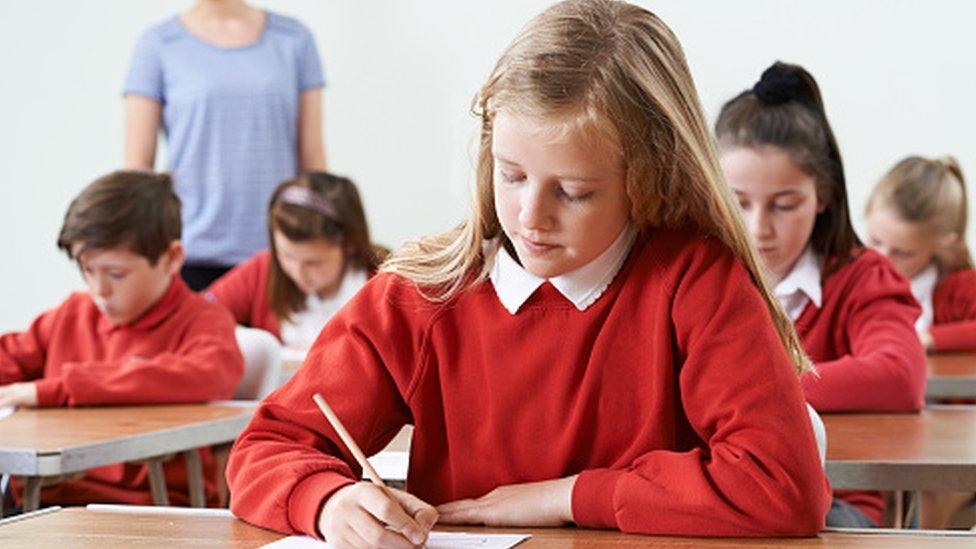Sats tests: Exam results 'manipulated for political agenda'
- Published

Exam pass rates and grade boundaries are being "manipulated" by governments and their agencies to justify political agendas, some head teachers suggest.
Delegates at the National Association of Head Teachers backed a motion calling on the union to "expose and discredit" any such manipulation.
One head teacher said his research showed "small irregularities" in test results around the time of elections.
Successive governments have said exams are administered independently.
Proposing the motion at the conference in Shropshire, Graham Frost featured his own research which shows a steady rise in primary school Sats results over time, but small irregularities appearing around the time of general elections.
When the official results are plotted on a graph with the 1997, 2001, 2005, 2010 and 2015 general elections mapped on to it, there are small increases or decreases in results just before or after the elections, he said.
Mr Frost suggested these blips in primary school test results were the result of governments trying to justify the need for their particular policies.
'Arbitrary changes'
"I suspect that there's a tendency to be tougher or less difficult in where they set those grade boundaries depending on the particular agenda," he said.
This was so familiar it was almost "accepted conduct", he told delegates.
Clem Coady, who seconded the motion, said: "We see the boundaries change year on year according to what story that they [politicians] want to tell."
The motion - backed by 99% of delegates at the conference in Telford - urges the union's leadership to campaign against what it describes as the "annual arbitrary changes in test and grade boundaries".
"We want to remove any possibility that government agencies can manipulate school performance data to support a particular agenda."
He described what he saw as the "crude" way in which pass marks are set in national tests such as Sats.
This is done in the first instance by using a teacher panel to assess and analyse which questions most children would be able to answer.
But there is an adjustment by the Standards and Testing Agency - an arm of government - before the final pass mark is set.
This, and a new set of primary school Sats tests at Key Stage 2, led to a dramatic fall in the pass rate in national tests at the end of primary school last year.
The proportion of children who met the Sats standard fell from 80% to 53% in 2016.
Mr Frost said such a drop could be used by a government to effectively "reboot" the system, so it could demonstrate later how effective an education policy had been.
Education Secretary Justine Greening said she in March that she had talked to head teachers, teachers and others about the longer-term issues that needed to be resolved to establish a settled, sustainable system.
She also pointed to a public consultation launched before the general election was called on potential changes to the primary assessment system in England.
'Incredibly concerning'
Labour said it believed politicians needed to start listening to the professionals instead of setting grade boundaries for short term political gain.
"Parents deserve to know exactly how their child is performing at school but the chaos this government has caused by continuously chopping and changing grade boundaries is undermining confidence in results." Labour added.
Liberal Democrat education spokesman John Pugh said: "This is clearly incredibly concerning - changes to the curriculum and the way qualifications are awarded should be decided by independent experts in the education field, not by politicians.
"We want to put an end to ministers meddling excessively in the way our children are taught and give pupils and teachers back some stability."
The Conservative Party has not yet commented.